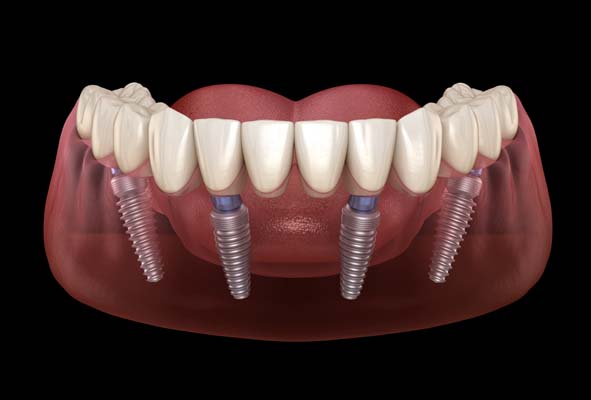Is Replacing Missing Teeth with All-on-4® Affordable?

The All-on-4® procedure is a popular tooth replacement option for those looking to transform their smiles. It relies on dental implants and dentures to create a replacement set of teeth. One common question that comes along with the All-on-4® procedure is how affordable it is. When considering tooth replacement, the price is often a concern.
The following article outlines how affordable the All-on-4® procedure is, as well as what it is like in comparison to other tooth replacement options. Ready to learn more?
Is the All-on-4 procedure affordable?
Before learning about the affordability of the All-on-4 procedure, it important to understand how everything works. This allows those considering the procedure to fully know what to expect.
The All-on-4® is a tooth replacement process that involves the placement of 4 dental implants per arch. Once the dental implants are placed, healed and fused with the jawbone, the general dentist will attach dentures. Implant-supported dentures are proven to be quite successful in the tooth replacement arena. Unlike other tooth replacement options, the All-on-4 combines two different oral pieces to make a hybrid method.
Is it affordable?
The All-on-4 procedure® is known to be an affordable tooth replacement option, however, it is good to know that dental implants are not cheap. Because dental implants require oral surgery in order to place them, the entire process can be pretty pricey. It is a good idea to work with a general dentist to outline costs, expectations and finances so that there are no surprises or disappointments once the process begins.
In comparison to other tooth replacement options
In comparison to other tooth replacement options, the All-on-4® procedure is relatively affordable. Unlike other options, the All-on-4 combines dental implants with dentures, making for a hybrid method of replacement. Because only 4 dental implants are required, the patient can receive an artificial set of teeth at a relatively low price.
When dentures are used to replace an entire arch of teeth, they do tend to be more affordable than other options such as dental crowns. Dental crowns are extremely pricey and when used to replace teeth, they can add up. Dental bridges are another option that are commonly used for tooth replacement, but they are not typically able to replace entire arches.
Things to know
When considering the All-on-4 procedure, it is good to know that the process requires time and patience. A lot of people looking to replace teeth are eager to see results immediately because of the cost and desire to get back to normal. However, because dental implant surgery is required, it does take time for the process to be complete. In the end, the results are worth the wait and the cost.
Learn more today!
Want to know more about the All-on-4 procedure and the costs that come along with it? Working with a general dentist to have teeth replaced using the All-on-4 system is a great place to start. Reach out today to learn more or to get started!
Request an appointment here: https://desertbloomdentistry.com or call Desert Bloom Dentistry at (928) 428-1617 for an appointment in our Safford office.
Check out what others are saying about our dental services on Yelp: All-on-4 in Safford, AZ.
Related Posts
The term All-on-4® refers to a more convenient alternative than conventional dentures. It involves installing dental implants into the patient’s jaw to serve as the base for a special type of dentures that are fixed in place.Traditional dentures are the most affordable way to replace missing teeth, but they have issues like poor stability. This…
Thinking about getting dental implants to take care of your missing tooth problem? Implants are commonly chosen by dental patients who are in need of tooth replacement services. While there are other replacement options available, these do not offer the unique benefits that implants do. One of these benefits is preventing jawbone loss, which is…
If you are a denture wearer, you will probably need a denture repair at some point. A broken denture can be very unsettling. It prevents a person from doing some of the most basic things, like eating and talking to others. There is an ongoing debate whether it is advisable to DIY a broken denture.…
If you are missing one or more teeth, you have several tooth replacement options from which to choose. One such option is dentures. Though dentures are no longer the preferred tooth replacement option for neither dentists nor patients, they continue to have a purpose. For some people, dentures are the only option. For others, they…
